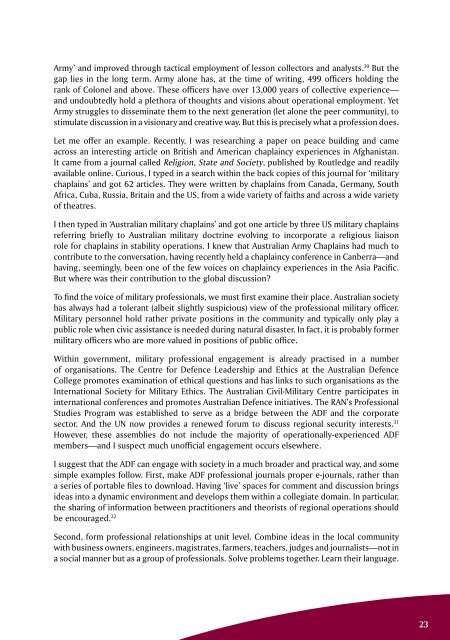ISSUE 191 : Jul/Aug - 2013 - Australian Defence Force Journal
ISSUE 191 : Jul/Aug - 2013 - Australian Defence Force Journal
ISSUE 191 : Jul/Aug - 2013 - Australian Defence Force Journal
- No tags were found...
Create successful ePaper yourself
Turn your PDF publications into a flip-book with our unique Google optimized e-Paper software.
Army’ and improved through tactical employment of lesson collectors and analysts. 30 But the<br />
gap lies in the long term. Army alone has, at the time of writing, 499 officers holding the<br />
rank of Colonel and above. These officers have over 13,000 years of collective experience—<br />
and undoubtedly hold a plethora of thoughts and visions about operational employment. Yet<br />
Army struggles to disseminate them to the next generation (let alone the peer community), to<br />
stimulate discussion in a visionary and creative way. But this is precisely what a profession does.<br />
Let me offer an example. Recently, I was researching a paper on peace building and came<br />
across an interesting article on British and American chaplaincy experiences in Afghanistan.<br />
It came from a journal called Religion, State and Society, published by Routledge and readily<br />
available online. Curious, I typed in a search within the back copies of this journal for ‘military<br />
chaplains’ and got 62 articles. They were written by chaplains from Canada, Germany, South<br />
Africa, Cuba, Russia, Britain and the US, from a wide variety of faiths and across a wide variety<br />
of theatres.<br />
I then typed in ‘<strong>Australian</strong> military chaplains’ and got one article by three US military chaplains<br />
referring briefly to <strong>Australian</strong> military doctrine evolving to incorporate a religious liaison<br />
role for chaplains in stability operations. I knew that <strong>Australian</strong> Army Chaplains had much to<br />
contribute to the conversation, having recently held a chaplaincy conference in Canberra—and<br />
having, seemingly, been one of the few voices on chaplaincy experiences in the Asia Pacific.<br />
But where was their contribution to the global discussion<br />
To find the voice of military professionals, we must first examine their place. <strong>Australian</strong> society<br />
has always had a tolerant (albeit slightly suspicious) view of the professional military officer.<br />
Military personnel hold rather private positions in the community and typically only play a<br />
public role when civic assistance is needed during natural disaster. In fact, it is probably former<br />
military officers who are more valued in positions of public office.<br />
Within government, military professional engagement is already practised in a number<br />
of organisations. The Centre for <strong>Defence</strong> Leadership and Ethics at the <strong>Australian</strong> <strong>Defence</strong><br />
College promotes examination of ethical questions and has links to such organisations as the<br />
International Society for Military Ethics. The <strong>Australian</strong> Civil-Military Centre participates in<br />
international conferences and promotes <strong>Australian</strong> <strong>Defence</strong> initiatives. The RAN’s Professional<br />
Studies Program was established to serve as a bridge between the ADF and the corporate<br />
sector. And the UN now provides a renewed forum to discuss regional security interests. 31<br />
However, these assemblies do not include the majority of operationally-experienced ADF<br />
members—and I suspect much unofficial engagement occurs elsewhere.<br />
I suggest that the ADF can engage with society in a much broader and practical way, and some<br />
simple examples follow. First, make ADF professional journals proper e-journals, rather than<br />
a series of portable files to download. Having ‘live’ spaces for comment and discussion brings<br />
ideas into a dynamic environment and develops them within a collegiate domain. In particular,<br />
the sharing of information between practitioners and theorists of regional operations should<br />
be encouraged. 32<br />
Second, form professional relationships at unit level. Combine ideas in the local community<br />
with business owners, engineers, magistrates, farmers, teachers, judges and journalists—not in<br />
a social manner but as a group of professionals. Solve problems together. Learn their language.<br />
23

















